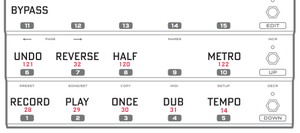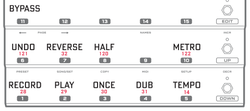This is the wiki for products made by Fractal Audio Systems, maintained by members of the community.
Looper block
Contents

Available on which products
- Axe-Fx III: 1 block
- FM3: 1 block
- FM9: 1 block
- Axe-Fx II: 1 block
- AX8: 1 block
- FX8: 1 instance
Channels or X/Y
The Looper doesn't support X/Y switching or channels.
About the Looper block
On the FM3, AX8 and Axe-Fx series, the Looper is a dedicated effect block, providing minutes of stereo or mono loop time. To use the Looper controls on the FM3, FM9 or FC-6/FC-12, a preset must contain a Looper block.
On the FX8, the Looper is a global feature, which position is customizable.
"Loopers have unique hardware requirements, i.e. lots of memory. General-purpose guitar processors like the Axe-Fx don't need the amounts of memory that loopers require and adding that memory for a single effect would increase costs, probably considerably. Furthermore the processors used in products like the Axe-Fx are limited in the amount of memory they can address. The DSP used in the Axe-Fx III is the most powerful commercial DSP available but it's still limited in it's memory address space. Also, most loopers trade off bit-depth and sample rate for loop time. Therefore you're unlikely to ever find a multi-effect that has the loop time and features as a dedicated looper. If I were to make a dedicated looper I probably wouldn't use a DSP but something like an ARM with a lot of external address space. There isn't really much audio processing required, it's mostly memory access." [1]
Axe-Fx III
The Looper provides more than 5 minutes of stereo looping time.
"We completely rewrote the Looper. Over five minutes of stereo recording with undo." [2]
FM3 and FM9
Same as Axe-Fx III, with 120 seconds of looping time.
Legacy devices
Axe-Fx II
- Mono — 60 seconds
- Stereo — 30 seconds
- Mono with Undo — 30 seconds
- Stereo with Undo — 15 seconds
AX8
- Mono — 4 minutes
- Stereo — 2 minutes
- Mono with Undo — 2 minutes
- Stereo with Undo — 1 minutes
Looper Control Mode is accessed using a F-switch.
FX8
The Looper in the FX8 has additional features. It's a global looper so it's always present, in every preset. It can be positioned in different locations. It can be disabled, which decreases CPU usage.
- Mono— 8 minutes
- Stereo — 4 minutes
- Mono with Undo — 4 minutes
- Stereo with Undo — 2 minutes
Locations:
- IN PRE
- IN POST
- OUT PRE
- OUT POST
The location can be set globally (Global Settings menu) and can be overridden per preset.
If you can't hear the Looper, check the LOOPER LOCATION. It must not be set to NO LOOPER. If it is set to GLOBAL, check the GLOBAL LOOPER LOCATION (Global Settings menu) to ensure that it is not set to NO LOOPER. This may also be due to PRE/POST settings. If your rig uses only the PRE chain or only the POST chain, set LOOPER LOCATION accordingly.
Parameters
Max Loop Time
This sets the maximum recording time. It allows a loop to be automatically created once the loop time exceeds this value.
If recording and time reaches the maximum recording time the mode changes to that specified by Record 2nd Press, only on the first pass of a new recording.
(Record) Threshold
If enabled, recording will not start until the input level passes the specified threshold, set by the Threshold parameter. If you press Record, you will see the indicator come on and then turn off. This means it is waiting for input to start recording. Once you start playing you'll see the indicator come on and you are recording.
Axe-Fx III, FM9 and FM3 – Use the soft knob or main Value knob to adjust the threshold value, or use the Record Threshold parameter on the Config page. When set to a value greater than -80 dB recording will not start until the input signal exceeds the set value. The Record icon will blink when the Looper is armed for recording and will turn solid when recording starts. The meter at the bottom of the page can be used to help set the Threshold. Use the soft knob or main Value knob to adjust the threshold value (or use the Record Threshold parameter on the Config page).
Crossfade
When set to ON, the loop fades out/in at the end/start of the loop.
Record
Start recording or enables overdubbing. There's no separate Overdub control on the Axe-Fx III, FM3 and FM9.
What happens when you press Record a second time is user-definable, see below.
Record 2nd Press
Axe-Fx III, FM9 and FM3 only.
Choices are:
- Overdub – Second press ends loop and enters Overdub mode.
- Play – Second press ends loop and enters Play mode.
- Stop – Second press ends loop.
Trim Start, Trim End
Axe-Fx III, FM9, FM3 and AX8 only.
Use these to adjust the start and end points of the loop. The graph on the Control page provides visualization of the loop and the start/end points.
Quantize
Quantize will automatically chop your recording to the nearest beat. Recommended to use in conjunction with Threshold. Press Record, then start playing on a downbeat click. Press Record again to stop. If you stop slightly too soon or late it will automatically trim the recording to the length. Also, it will automatically start playback on the downbeat. So if you stop playback and start it up again later, it should always come back in on the beat.
Undo/Erase
In firmware Ares and later:
- When recording, this function/switch operates as Undo, removing the last recorded stack layer.
- When playing the loop, this function/switch enables or disables the last Undo operation. Subsequent presses toggle the layer on and off.
- When the playing is stopped, this function/switch changes into Erase, completely erasing the recorded loop.
Undo/Erase requires CPU cycles during a brief moment. When used with presets with high CPU utilization, this can result in warnings or audible pops.
Dub Mix
"Dub Mix reduces the previous layer AFTER you add a new layer (press Stack then press it again)." [3]
(Half) Speed
When Speed is set to HALF, the virtual tape runs at half the normal speed. The speed can be also be toggled via a MIDI CC message.
Remote control
Foot switches
Assign the Looper controls (such as Play and Record) to foot controller switches for remote control. Some functionality requires a latching switch, for other stuff a momentary switch is required.
You can also assign Looper Record/Play to an external switch, for easy access at all times.
If you use a controller with Tap and Hold functions, be aware that the function triggers on the upstroke of the switch, not the down. To avoid this, don't assign a HOLD function to the RECORD and PLAY switches. Alt., set Looper Record 2nd Tap to PLAY and use that to end your recordings.
MIDI CCs
The Axe-Fx II uses these MIDI CCs for remote control.
- Record: 28
- Play: 29
- Once: 30
- Dub: 31
- Rev: 32
- Bypass: 33.
- Half: 120
- Undo: 121
The Axe-Fx III, FM9 and FM3 let you map MIDI commands to the Looper in the MIDI/Remote menu.
MFC-101 Looper Control Mode
The MFC-101 MIDI foot controller has a Looper Control Mode. This mode is enabled by pressing and holding the Reveal switch. The MFC-101 will display "LOOPER CONTROL MODE" for two seconds and the red LED will be lit on the Reveal switch. This mode is disabled by selecting the Reveal switch. In Edit > Setup you can select if this requires short or long pressing-and-holding. You can also disable Looper Control Mode altogether.
MFC-101 Looper Control Mode Mini Manual

FX8 and AX8
The AX and FX8 allow the onboard switches to be assigned to Looper functionality.
FM3
The FM3 and FM9 allow the onboard switches to be assigned to Looper functionality, or you can assign these to a connected FC controller.
FC-6 and FC-12 controllers
The FC controllers let you operate the Looper.
Tips, tricks and troubleshooting
No delay when pressing Record
Switches on the FM3, FM9 and FC controllers that have a secondary HOLD function, typically engage on the "release" action, instead of on the "press" action. This can cause an undesired delay when operating the looper, especially when pressing the Record switch. Solve this by disabling the HOLD function of the switch.
Tweaking tool
The Looper is an excellent tool for tweaking sounds. Place it before before the Amp block, and record a loop. Now keep playing it back while you adjust amp settings, change the cab, adjust effects etc. You'll hear the differences in real time.
Or use it to compare two sounds. Place it after the Amp block and record. Start tweaking. When you want to hear the original tone, play back the sample.
Survive switching presets
The loop buffer will be erased when switching presets, unless Spillover is enabled in the Global Settings menu. And to survive preset switching, both presets must contain the Looper, set to the same mode.
Route the output
The Output blocks and effects loops on the Axe-Fx III, FM9 and FM3 make it easy to send the signal coming from the Looper to a specific output for further processing and routing.
Soundcheck
Record a loop and press Play. Now get off the stage, walk around the venue and listen.